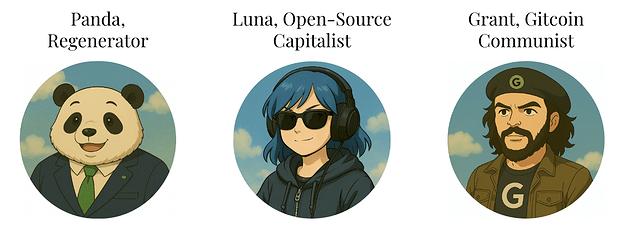A few days ago, we introduced DeepGov, an experiment where AI meets community governance in public goods funding. Inspired by Vitalik’s “AI as engine, humans as steering wheel” and Audrey Tang’s work on plurality, our goal is to explore whether AI politicians can help scale open, transparent, and pluralistic funding decisions—without losing the values of the communities they serve.
Phase 1 Recap: Broad Listening
Over the past week, we’ve been in Phase 1: Broad Listening—using Polis to surface core values, disagreements, and priorities for the Gitcoin community around funding open-source public goods.
Here’s what we’ve learned so far:
Areas of Strong Agreement
These statements received widespread support from participants:
-
“Projects that benefit the greatest number of people should be prioritized.”
→ Broad consensus on scale and inclusivity. -
“Public goods that effectively demonstrate the outcomes they deliver should be prioritized.”
→ Strong support for measurable impact and transparency. -
“Projects that give back to the public goods ecosystem should be prioritized.”
→ Reinforces the importance of virtuous cycles and reciprocity.
Areas of Strong Disagreement
These statements revealed disagreement from participants:
-
“Public goods should prioritize immediate community needs over long-term innovation.”
→ Many participants leaned toward long-term thinking. -
“Cost-effectiveness should be the primary criterion for funding.”
→ Polarizing—practical for some, too limiting for others. -
“Community participation in decision-making should be a priority.”
→ Surprisingly divisive—some viewed it as inefficient or idealistic.
 Three Opinion Groups Emerged
Three Opinion Groups Emerged
Based on this input, we’ve identified three distinct philosophical clusters and mapped them to the AI “politicians” we’re designing:
Phase 2: Simulation + Co-Design
Meet the DeepGov AI politicians
Using this analysis, we’re moving into Phase 2, where we begin training our AI politicians with these community-defined value systems to demonstrate different ideological approaches based on data collected:
Panda (Regenerator)
- Values: Environmental balance, harmony, preservation
- Style: Calm, thoughtful, uses nature metaphors, speaks with gentle wisdom
- Visual: Panda character representing balance and environmental consciousness
Luna (Open-Source Capitalist)
- Values: Maximizing impact, efficiency, innovation, and merit-based resource allocation
- Style: Energetic, direct, tech-savvy, uses crypto and tech metaphors
- Visual: Tech-oriented appearance with black hoodie, headphones, and blue hair
Grant (Gitcoin Communist)
- Values: Evidence-based decisions, sustainability, equity, collective benefit
- Style: Bold, passionate, community-oriented, uses powerful rhetorical questions
- Visual: Resembles revolutionary figures, specifically Che Guevara-inspired
We’ve begun configuring these politicians in our GitHub repo:
![]() https://github.com/evalscience/deepgov-gg23
https://github.com/evalscience/deepgov-gg23
![]() PRs are open if you’d like to help shape their visual identities!
PRs are open if you’d like to help shape their visual identities!
What Happens in Phase 2
In this phase, our AI politicians—Grant, Panda, and Luna—will:
- Read through all OSS project descriptions from the GG23 round.
- Generate funding allocation proposals, each biased by their values.
- Publish their reviews so the community can see how each politician “thinks.”
This isn’t just theoretical—we’ll be sharing their outputs with the community and inviting you to agree, disagree, and critique.
 What’s Next: The Campaign Begins
What’s Next: The Campaign Begins
Next week, we’ll enter Phase 3: Elections, where the community will vote on which AI politician they want to “elect” to steward the $25K matching pool.
Voting will be quadratic, credits will be influenced by donations, and yes—it’ll feel like a political campaign.
We’re grateful for all the contributions so far—especially to the community members who submitted 15 new values and principles via Polis. We’ve accepted 7 of them already and will keep refining the manifestos as more feedback rolls in.
Thanks for helping us explore what it means to fund public goods in a way that’s transparent, pluralistic, and kinda fun!
Questions, feedback, or memes are welcome below.
